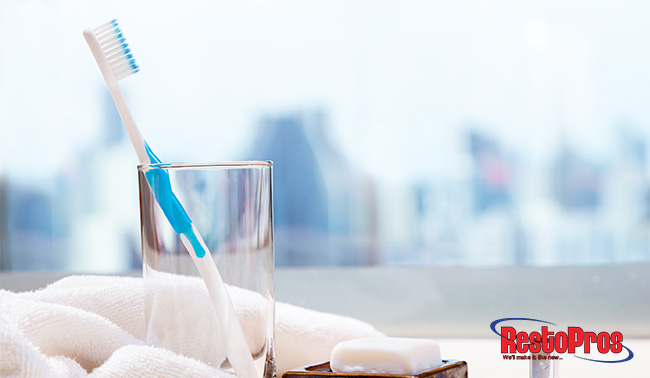Everyone knows their food products have expiration dates and when to dispose of them. Besides the expiration date, it’s easy to identify if your food has gone bad. Seeing mold on your cheese or smelling a foul odor on your meat are sure signs to throw them away. However, do you know when other household goods expire? Often, people don’t consider the shelf life of non-food products in their home. Knowing when to replace common household items is important when keeping your home safe from contaminants and mold. Some household goods even have shorter lifespans than food. Dallas/Fort Worth homeowners must be mindful of the expiration dates of ALL their goods. The experts at RestoPros have compiled a list of common items that do expire – and should be replaced to avoid sickness or injury.
-
Toothbrushes
- A toothbrush is littered with bacteria after regular use, and letting its shelf life go unnoticed can have unpleasant consequences.
- Toothbrushes usually last about 3 months, and subsequently should be thrown away and replaced.
- Expired toothbrushes eventually lose the strength of their bristles, which means they can no longer clean your teeth as well.
- Looser bristles allow bacteria and mold to grow and infect your toothbrush.
- Not only will an old toothbrush not clean your teeth well, it may make you sick from the bacteria and mold.
- Speaking of sickness, replace your toothbrush immediately after having an illness to prevent getting sick from previous germs.
-
Shoes
- Shoes are meant to protect your feet, meaning they must survive harsh conditions consistently.
- Generally, shoes last about 2-5 years, with notable wear often occurring after this window.
- Shoes contain leather, rubber, glue, and other materials that decay over time.
- After consistent use, shoes will lose the adhesive from parts that have been glued.
- Moisture seeps easier into damaged shoes, leading to mold growth that can also infect your socks and feet.
- Wearing older, worn shoes gives your feet little protection, and can cause athlete’s foot if they are infected with mold.
-
Bed Pillows
- Bed pillows are met with hair, body oils, food, pets, and much more.
- Bed pillows should be replaced 18 to 24 months, and doing so will keep them fresh and allergen-free.
- Pillows spend a lot of time in dark areas, and are more susceptible to mold growth when in proximity to high humidity or water.
- Old bed pillows attract bugs and bacteria to your bed, meaning your covers and mattress can also be infected with mold and bacteria.
-
Kitchen Sponges
- The sponge is the main tool for cleaning your kitchenware, and must be prepared for the job.
- Since kitchen sponges deal with countless amounts of bacteria, they only last about 2-3 weeks before needing replacement.
- Kitchen sponges older than about a month tend to be torn and have little scrubbing power.
- Mold and bacteria easily grow on kitchen sponges after prolonged use.
- Cleaning with old kitchen sponges takes longer to scrub away dishes, and may dirty the kitchenware even more.
-
Bath Towels
- Bath Towels last anywhere from 5-10 years, but their lifespan decreases when misused or improperly placed.
- Towels are meant to soak up liquids from whatever they touch, and they build up bacteria over the years.
- Properly cleaning your bath towels works great to maintain their lifespan, but some germs don’t go away.
- Old bath towels have a greater chance to grow mold, especially if left in dark rooms when damp.
- Leaving old towels on the floors can spread the mold to your floor or carpet, leading to bigger problems than a moldy towel.
Knowing when these common household items expire can easily prevent health risks and mold damage. If you have noticed your home contaminated with any mold, contact RestoPros immediately. We offer premium mold remediation services to DFW homeowners, and provide guidance on the best mold prevention practices. Give us a call at 855-587-3786 to schedule a professional assessment today!

